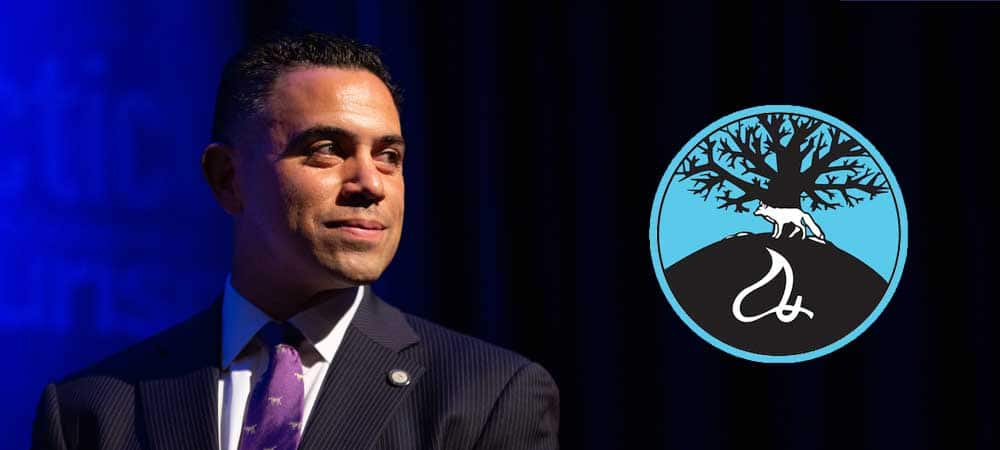- Tribal Chairman of the Mashantucket Pequot Tribe, Rodney Butler, wants answers as to why his Tribe and the Mohegan Tribe cannot open up legal sportsbooks in Connecticut.
- A 1991 gaming compact gave exclusivity to all gaming in Connecticut for these two Tribes which would make sports betting legal at this time.
- An estimated $80 million a year could be made from a legal sports betting market in Connecticut.
HARTFORD, Conn. – Rodney Butler, Tribal Chairman of the Mashantucket Pequot Tribe, is questioning the efforts of lawmakers in Connecticut and the lack of a legal Connecticut sports betting industry.
Butler’s questions are coming at a time when major sports as well as casinos in the nation have all reopened or are in the final phases of doing so.
The Mashantucket Pequot Tribe owns the Foxwoods Resort Casino while the Mohegan Tribe owns the Mohegan Sun Casino in the Nutmeg State. Neighboring states have begun to make sports betting legal, leaving these two federally recognized Tribes in Connecticut wondering why they are not allowed to offer sports gambling to their own patrons.
An estimated $80 million in revenue is being left on the table without sports betting in Connecticut.
Efforts In 2020 For Sports Betting In Connecticut
During the 2020 legislative session, bills that would have legalized sports betting were discussed in the Connecticut State Legislature. However, there was plenty of opposition among the proposals.
One would have allowed both Tribal and commercial sportsbooks to open for business, much to the disdain of the Tribes in the state.
Tribes want to have the full monopoly on the sports betting market in Connecticut as they say is their right stemming from the 1991 gaming compact that allowed them to open their casinos. The compact gave Tribes in Connecticut exclusivity overall gaming which would include sports betting.
In return, they pay 25% of all revenue gained from slot machines to the state. Should the Nutmeg State pass legislation that allows for commercial sports wagering then the Tribes would consider the 1991 compact to be null and void and would no longer pay the millions of dollars they’ve been paying in revenue.
“Like we’ve always said, and it’s not a threat, we’d just stop paying the state. There’s no hard feelings, it just is what it is,” said Butler. “I guarantee you, everyone (in state government) appreciated the $20 million they got from the Tribes in June. I mean, where else were they getting tax receipts from?”
There are equal sides that want strictly Tribal sports betting while others prefer an open market. The subject stalled out and ended in a stalemate at the adjournment of the session.
And when the outbreak of COVID-19 occurred, the focus shifted to dealing with the crisis that the pandemic had caused, leaving no more time open for discussions on legal gambling on sports, at least for not within the 2020 session.
What Butler Wants To See
Butler believes the 1991 Tribal-State Compact which permitted the two federally recognized Tribes, the Mohegan Tribe, and the Mashantucket Pequot Tribe to have rights to all gaming in the state also would allow for legal sports betting to take place at their establishments.
“This already exists – we’re just debating over who can operate it,” said Butler. “If we all agree it’s something we can do, then it’s only ourselves in the way of getting it done.”
By the argument raised by Butler, legal sportsbooks in Connecticut could open through the two Tribes right now. But there is a miscommunication between the Tribes and the government standing in the way. And again, it all falls back to the 1991 compact.
What’s Next For Connecticut And Legal Sports Betting?
If the state can agree that Tribes are eligible to open sports betting venues based on their original gaming compact then Connecticut could see a legal sports betting market as soon as details of the new market could be solidified amongst the Mohegan and the Mashantucket Pequot Tribes.
However, if the state refuses to honor the compact then they risk losing millions in revenue that they desperately need to come back from the holes in the budget that the Coronavirus has caused.
The main question is simple; who will back down? The Tribes in Connecticut or the lawmakers of the state?
Each has something to lose but the Tribes will only lose sports betting and get to pocket the 25% they’ve been paying the state. The state will lose that 25% and need to wait for a new session to discuss legal sports betting unless they open up for a special session on the topic.
But even then, a bill coming to pass in 2021 is not something set in stone whereas their 25% revenue cut already is.
And should they greenlight Tribal sports betting, they have the potential to gain even more revenue making the idea of obliging Butler and the Tribes to open up sportsbooks the smart move for the state of Connecticut at this time.
An open sports betting market may generate more money for the state’s sports betting industry specifically. But with COVID-19 struggles and the state’s dependence on slot revenue, lawmakers may end up biting the bullet and siding with the tribes.
Advertising Disclosure
In order to provide you with the best independent sports betting news and content LegalSportsBetting.com may receive a commission from partners when you make a purchase through a link on our site.
News tags: 1991 Tribal-State Compact Connecticut | Connecticut | Connecticut State Legislature | Coronavirus | COVID-19 | Foxwoods Resort Casino | Mashantucket Pequot Tribe | Mohegan Sun Casino | Mohegan Tribe | Rodney Butler

Christina has been writing for as long as she can remember and does dedicated research on the newly regulated sports betting market. She comes from a family of sports lovers that engage in friendly bets from time to time. During the winter months, you can find Christina baking cookies and beating the entire staff at Mario Kart…the N64 version of course.


 Bitcoin Sports Betting Sites
Bitcoin Sports Betting Sites Best Online Sports Betting
Best Online Sports Betting Famous Sports Bettors
Famous Sports Bettors States With Legal Sports Betting
States With Legal Sports Betting Sports Betting Events
Sports Betting Events




